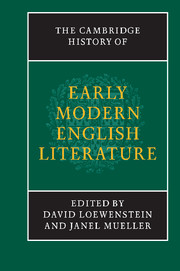Book contents
- Frontmatter
- Introduction
- 1 Modes and means of literary production, circulation and reception
- 2 The Tudor era from the Reformation to Elizabeth I
- 3 The era of Elizabeth and James VI
- 4 The earlier Stuart era
- 15 Literature and national identity
- 16 Literature and the court
- 17 Literature and the church
- 18 Literature and London
- 19 Literature and the theatre to 1660
- 20 Literature and the household
- 5 The Civil War and Commonwealth era
- Chronological outline of historical events and texts in Britain, 1528–1674, with list of selected manuscripts
- Select bibliography (primary and secondary sources)
- Index
- References
16 - Literature and the court
from 4 - The earlier Stuart era
Published online by Cambridge University Press: 28 March 2008
- Frontmatter
- Introduction
- 1 Modes and means of literary production, circulation and reception
- 2 The Tudor era from the Reformation to Elizabeth I
- 3 The era of Elizabeth and James VI
- 4 The earlier Stuart era
- 15 Literature and national identity
- 16 Literature and the court
- 17 Literature and the church
- 18 Literature and London
- 19 Literature and the theatre to 1660
- 20 Literature and the household
- 5 The Civil War and Commonwealth era
- Chronological outline of historical events and texts in Britain, 1528–1674, with list of selected manuscripts
- Select bibliography (primary and secondary sources)
- Index
- References
Summary
In his dedication of the 1616 folio version of Cynthia’s Revels, Ben Jonson addressed the early Stuart court as ‘A bountiful and brave spring’ that
waterest all the noble plants of this island. In thee, the whole kingdom dresseth itself, and is ambitious to use thee as her glass. Beware, then, thou render men’s figures truly, and teach them no less to hate their deformities than to love their forms; for, to grace there should come reverence, and no man can call that lovely which is not also venerable.
Thus described, the court is inseparable from the nation at large: not only does it ‘water’, or offer economic and other sustenance, to the ‘noble plants’, the aristocracy and gentry, but it also ‘mirrors’, or provides through its own collective outward ‘grace’ and loveliness, and its inward sagacity and probity, a set of patterns against which other elements of the kingdom define themselves and each other and determine their relative worth.
It is doubtful whether the Stuart court was as central to all areas of the emerging nation as Jonson claimed it was: in defining it as he did, Jonson, whom James I appointed Poet Laureate and granted an annual pension in that very year of 1616, sought in part to establish the value and significance of his new position. But his definition also points towards an important historical truth: under James, significant elements of court culture were more visible to the nation at large than they had been at any previous time in British history if only because so much of the literature associated with the court was routinely brought into print.
- Type
- Chapter
- Information
- The Cambridge History of Early Modern English Literature , pp. 487 - 511Publisher: Cambridge University PressPrint publication year: 2003

